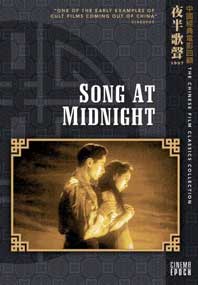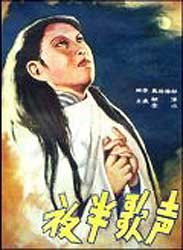 As Song of Midnight (Ye bang ge sheng, 1937) begins, an elderly, stooped figure with a kerosene lantern treads the night. He meets another man & they discuss whether or not "he" will come again tonight.
As Song of Midnight (Ye bang ge sheng, 1937) begins, an elderly, stooped figure with a kerosene lantern treads the night. He meets another man & they discuss whether or not "he" will come again tonight.
The wind rises portentiouly & something seems to be present. From various houses people gaze surreptitiously into the night then quietly close their doors & windows.
Seen only as a shadow, a cowled figure sings in a sweet voice a lyric of ghostliness: "In the empty court fireflies are flying/ On their high shoes foxes are walking/ A man walks in the lonely night/ the night's only sound, the sound of the night/ Who will wait for the dawn with me?"
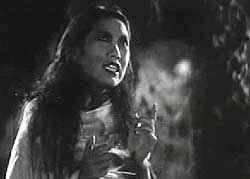 As his song continues, the rains begin, & we see within a cobwebbed house two figures walking with a single candle, a young & old woman who go to an open window to listen to the singer in the night: As his song continues, the rains begin, & we see within a cobwebbed house two figures walking with a single candle, a young & old woman who go to an open window to listen to the singer in the night:
"My face is as hideous as a ghost's/ My heart is hard as iron/ But I am alive & I will fight that demon lord/ Ah, miss, only you see my life."
The beautiful young woman peers into the night with seriousness & empathy as the shadowy singer concludes his lengthy "Song of Midnight." The maiden is dressed in the gown worn by Elsa Lancaster as The Bride of Frankenstein (1935) as the Chinese director greatly admired Universal horror films!
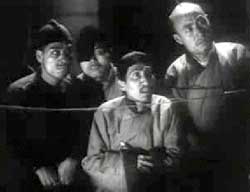 Horse-drawn carts & buggies speed through the rainy night on the muddy road. Horse-drawn carts & buggies speed through the rainy night on the muddy road.
It's the promised acting troupe's arrival. There's no one at the theater at this hour, & it takes them a while to get in from the rain, as they must seek an inn. Their spirits are high despite the downpour, the mood quite the opposite from when the shadow-singer dominated the first quarter-hour of the tale.
Eventually a hunchbacked old man with kerosene lamp takes them through the unlit theater. As the many members of the troupe follow his shuffling gate through dark hallways, they all go quiet & dour, as it's all so spooky, cobwebby, infested with mice, obviousy in disuse a long time, & not at all the type of theater they thought they'd be performing in.
The night photography is consistently beautiful, with an equally consistent mood of ghostliness. As the troupe has a show to do the very next day, they've no choice but to stay up all night, half of them cleaning & preparing the theater in shifts while the other half practices the Song Dynasty opera they will be giving to the public. We are given fragments of the opera as they practice through the night.
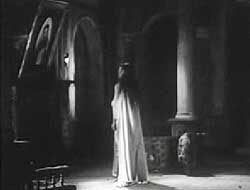 Sun Xiao Ou (Si Chao) is the young man who is the leading man of the opera. Having trouble singing the new part, he needs time alone to practice, & it is then that the shadowy figure reappears (as a shadow against the backdrop), & from a hiding place performs the very number that had foiled the leading man. Sun Xiao Ou (Si Chao) is the young man who is the leading man of the opera. Having trouble singing the new part, he needs time alone to practice, & it is then that the shadowy figure reappears (as a shadow against the backdrop), & from a hiding place performs the very number that had foiled the leading man.
He listens to the perfect rendition then searches for the singer, but the old hunchback implies it is the ghost of the famous opera singer Song Dangping (Jin Shan).
"How strange. It is almost as if he were instructing me," says Xiao Ou, which is indeed what the opera phantom is doing. Through the night he practices alone -- or with the instructive voice of Song Dangping correcting his performance.
The opera "Yellow River Love" opens the following evening, & we watch part of it performed in costume. Xiao Ou is brilliant thanks to the ghostly instruction.
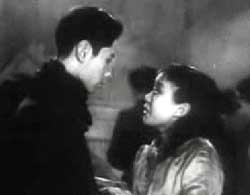 Xiao Ou becomes the idol of the town & one night alone tries to thank the spirit for its voice lessons. He follows the sound of the phantom down stairways into long forgotten corridors thick with cobwebs & cluttered with fallen bits of masonry, discovering the lair of the phantom, who isn't a ghost but hides his face in a cloaking hood. Xiao Ou becomes the idol of the town & one night alone tries to thank the spirit for its voice lessons. He follows the sound of the phantom down stairways into long forgotten corridors thick with cobwebs & cluttered with fallen bits of masonry, discovering the lair of the phantom, who isn't a ghost but hides his face in a cloaking hood.
He says, "Don't be afraid. I am a man with flesh & bones & a soul." Thirteen years before he had been a revolutionary soldier willing to sacrifice himself for the martyr Jin Zijian. He fought for three years before war got him so depressed that he changed his identity & became a singer, & found new renoun in the opera houses.
He performed such plays as "Red Blooded" which on the surface seemed to be about the war in Europe, but through which he could carry on his revolutionary message. In a flashback we see him in his prime singing "Who would like to be a slave?" It was at this time that he fell in love with Xia (Woo Ping), the woman we'd seen gazing into the night.
The affair enraged her father, who considered actors lowlife outcasts. To put an end to it, the father had the opera singer kidnapped, bound, & beaten. Tang Jun, an evil rival for Xia's hand, is a local warlord who horrifies Xia. Out of jealousy he has one of his men throw acid in the actor's face.
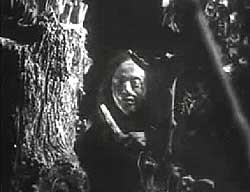 After he became disfigured, he hid himself away in the abandoned opera house these ten years since. Zhang the hunchback, guard of the Garden Theater, protects his secret.
After he became disfigured, he hid himself away in the abandoned opera house these ten years since. Zhang the hunchback, guard of the Garden Theater, protects his secret.
Not until the midway point of the film, a full hour in, is his face revealed, an extraordinary make-up job that goes well beyond merely hideous.
Xia had lived in mute madness for the ten years, believing her beloved was dead. She makes monthly pilgrimages to the balcony to listen to his ghost sing by the full moon. Only when she becomes convinced he lives will she regain her senses.
Song Danping with a forgiving nature never sought revenge against Tang Jun, but from his hidden place hoped for little beyond the possibility of one day rebuilding the theater with a worthy talent. He thinks Sun Xiaoou may be the right man.
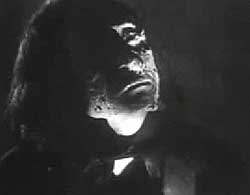 But warlord Tang Jun has never given up his evil ways, & having become fixated on one of the troupe's actresses, Liu Die whom our hero Xiao Ou loves, would rather murder her than be rejected. But warlord Tang Jun has never given up his evil ways, & having become fixated on one of the troupe's actresses, Liu Die whom our hero Xiao Ou loves, would rather murder her than be rejected.
Only then does Song Danping move against his old foe, with an extended fight resulting in the evil man falling to his death.
In a climactic scene reminiscent of Frankenstein (1931), Song Danping is pursued through the night by peasants & soldiers with torches. He takes refuge in a tower which is set afire. He at first makes no attempt to escape the flames, though the tower overlooks the sea into which he might finally leap to safety.
The relentlessly gloomy cinematagrphy is all but exclusively of night scenes. The melodramatic hystrionics of the male & female leads are effective rather than merely overdone. The great set designs add to the perfection of the film. It is truly a superior & romantic horror film, a Chinese take on the old Universal insistence on a sympathetic monster.
Given the popularity of opera films in China in the 1930s it seems this should have been a stupendous hit. But in fact it did poorly, perhaps because it borrowed too many western cinematic conventions & was not "Chinese" enough, perhaps because the public wasn't looking to become horrified in the cinema.
copyright © by Paghat the Ratgirl
|
